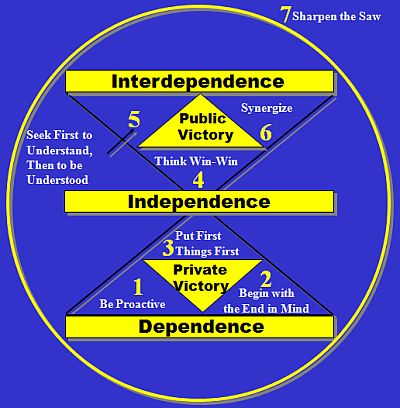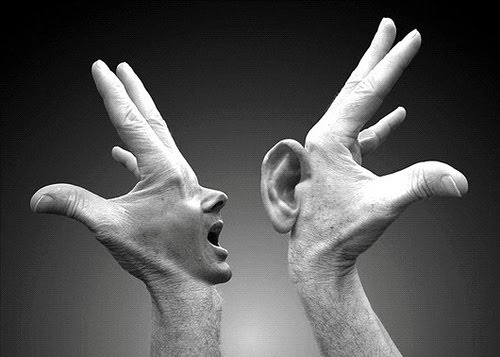The 7 Habits of Highly Effective People
By Stephen R. Covey [The following is a synopsis of The 7 Habits]
People are shaped by the paradigms they accept as irrefutable. Some of those paradigms prevent individuals from achieving their full potential, ex: “I will never be happy” leds to that person never truly being happy. A paradigm shift is therefore necessary to make you more effective as a member of a family, community, and species.
Covey argues that the 7 Habits are a) extremely basic and obvious, b) apply everywhere/universally, c) the ‘true north’ principles of a character ethic that is timeless.
YOU need to internalize the 7 Habits using three methods:
1) Learn it: understand the material contained herein.
2) Teach it: the best way to learn something is to teach it. It will give you a sense of social commitment to the material, and cultivate the habits by helping others. Being a teacher puts you in different role; if you really want to significantly change your/or someone you love’s behavior, give them a new role. Change their position in the social dynamic: make them the teacher as well.
3) Live it: be the change you want to see in yourself & the world.
The way to see your role in the world is to change your paradigm.
[IMAGINE THIS SITUATION]: The subway in New York on a Sunday. It’s a quiet morning. Suddenly, a father with 5 children enters your subway car. The kids are unruly, loud, noisy and uncomfortably for all passengers. The kids are yelling, making a scene. You turn to the father and say; “Sir, I was wondering if you could control your children?” He turns to you slowly and timidly says; “I guess I should….We just got back from the hospital….their mother just died this afternoon, and I guess they don’t know how to handle it. Neither do I.” Your paradigm is changed immediately. Now you want to offer help. Attitudes shift suddenly and yet the external world has not been altered at all…why has this happened? Think about it. Attitude matters.
Self-Determination: It isn’t what happens to us that effects our behavior, it’s how we interpret what has happened to us and our behavior; we can get a different paradigm in our thinking: we are capable of changing ourselves.
What Is A Habit? It is a principle you internalize, especially if it is a habit of effectiveness. In business, for example, a principle is to value a customer, and you might internalize that principle: it guides you regarding a) knowing what to do, b) the skills used to do it, and c) the attitude to want to do that thing. A habit is the same:
YOU need:
a) the knowledge to know what to do;
b) the skills to know how to do;
c) and the attitude to want to or know why to do. These three elements must converge to become a habit. YOU need to know what to do, have the skill to do it, and the attitude to want to do it.
Dependency, Independency, Interdependency: All of nature and society is interdependent. You need to become interdependent not dependant or independent.
Dependency is the attitude of you: I blame you for failures, it’s your fault that this didn’t work out. It’s everyone else that is responsible for my situation. Society, government, and the economy….
Independence is the attitude of “I”” For example, “I” will do it. Independence get what they want through their own effort. I can achieve what I want to achieve, thank you very little.
Interdependency is the attitude of we: We will do it and we can accomplish it. They require their own effort and the help of others. We can only be interdependent after moving from dependency to independency, and finally to the goal of interdependency.
1st, you need to understand the Habits 1, 2, 3: You need to deal with the personality habits of the independent character. You are the personality ethic of your self as long as you are not an iceberg. You don’t want to develop life patterns that are manipulative, seeking quick fix ideas, ways of getting what you want now by whatever self-destructive means necessary. You want to avoid that kind of personality. MORE after the jump.














